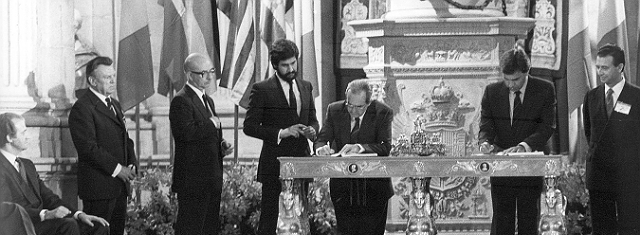Politics
Spain celebrates 30 years of EU membership
King Philip VI presides acts

The signing took place on June 12, 1985 (Source: Spanish Ministry of Foreign Affairs)
USPA NEWS -
With an official ceremony at the Royal Palace in Madrid this Wednesday, June 24 was celebrated the 30th anniversary of the accession of Spain to the European Communities. King Philip VI presided at the ceremony, which was attended by President of the European Parliament, Martin Schulz.
Schulz was invited to participate in the event, which was also attended by retired King Juan Carlos of Borbon, under whose reign the accession was signed, and the Spanish Prime Minister, Mariano Rajoy, with whom the EP President met in the tomorrow to discuss issues related to the European Council meeting in Brussels on Thursday and Friday. The signing of the Accession Treaty of Spain to the European Communities took place on June 12, 1985 and was the culmination of a process begun in 1977 when the then Spanish Prime Minister Adolfo Suarez, presented to the EU authorities the application for membership on 26 July of that year.
The negotiations were officially launched on February 5, 1979 and were led by the presidents of the Spanish government Leopoldo Calvo Sotelo and Felipe Gonzalez. Felipe Gonzalez was precisely who signed the treaty with the then Foreign Minister, Fernando Moran; Secretary of State for Relations with the European Communities, Manuel Marin, and the Ambassador of Spain to the EU, Gabriel Ferran. The Lower House of the Spanish Parliament unanimously ratified accession and Spain joined the European Union on January 1, 1986.
One June 12, 1985, to welcome Spain to representatives of EU institutions, King Juan Carlos I said, "embody what the Spanish people understand by Europe: the principles of freedom, equality, pluralism and justice who also chaired the Spanish Constitution. The Spanish people receive you satisfied and aware of the great significance that this event holds. If your countries are Europe, Spain so is its culture and secular will. At the dawn of the modern era, when constituting the international community, Spain was present as one of the first nation-states constituted in our continent."
Since joining, Spain has held the rotating EU presidency four times: in the first half of 1989, the second in 1995, in the first half of 2002 and the first semester of 2010. During the first semester of Spanish presidency EU progress was made in the internal market directives and the Economic and Monetary Union and the social dimension of economic integration, which culminated in the presentation of the European Social Charter.
During the second rotating presidency of Spain's name would have the single currency, the euro, and the timetable for adoption was decided. But the most significant advances were in foreign policy. A New Transatlantic Agenda and Joint Action Plan agreed with the United States, and was organized in Barcelona the first Euro-Mediterranean Conference. It also set a date for the Intergovernmental Conference on the reforms necessary for enlargement and a timetable for such expansion to the east was fixed.
During the Spanish presidency of 2002, the euro was put into circulation as currency in Europe. The convening of a Convention also agreed to reform the EU institutions. The attacks of September 11 last year boosted cooperation as a priority in the fight against terrorism: seven countries agreed to bring forward to 2003 the entry into force of the "arrest warrant" and move towards the harmonization of penal sanctions.
Liability for this article lies with the author, who also holds the copyright. Editorial content from USPA may be quoted on other websites as long as the quote comprises no more than 5% of the entire text, is marked as such and the source is named (via hyperlink).






